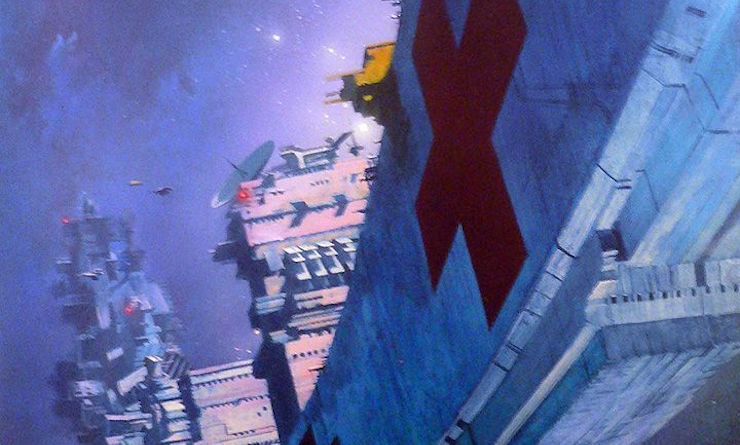One of the best things about science fiction and fantasy is the malleability of genre: practically anything can be combined to make a fun and credible subgenre. One of our favorites is the SFF-tinged medical thriller. After all, the only thing more frightening than a runaway virus is a runaway virus from space… or maybe a runaway virus that’s actually vampirism?
Yeah, that’s definitely scarier.
We’ve rounded up ten examples of medical sci-fi, fantasy, and horror, but we’re sure we missed some classics, so let us know your favorites in the comments!
I Am Legend—Richard Matheson
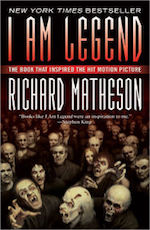 This existential horror classic revolves around Robert Neville’s fight for survival in a world that has been transformed by a pandemic. After a terrible war, people began exhibiting signs of an illness that seemed to bring the worst myths about vampires to life. Neville’s wife and daughter both die from the disease—but then Neville has to kill the vampiric version of his wife when she returns from the dead.
This existential horror classic revolves around Robert Neville’s fight for survival in a world that has been transformed by a pandemic. After a terrible war, people began exhibiting signs of an illness that seemed to bring the worst myths about vampires to life. Neville’s wife and daughter both die from the disease—but then Neville has to kill the vampiric version of his wife when she returns from the dead.
Now Neville spends his days gathering supplies and killing resting vampires, and his nights barricading himself in as the infected swarm his house. Rather than allowing loneliness and depression to kill him, he also begins researching the illness, hoping to find a cure. For a while, the book becomes a medical/vampire/mystery, before tipping back over into full horror territory.
Panacea and The God Gene—F. Paul Wilson
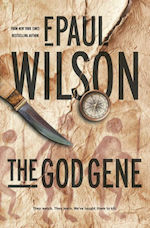 In F. Paul Wilson’s globetrotting series, human history and civilization has been shaped by Intrusive Cosmic Entities, or ICE. Because human-level sentience and intelligence is incredibly rare in the universe, humans routinely attract the attention of various ICE, becoming objects to be used or abused at their whim and for their own unknown purposes.
In F. Paul Wilson’s globetrotting series, human history and civilization has been shaped by Intrusive Cosmic Entities, or ICE. Because human-level sentience and intelligence is incredibly rare in the universe, humans routinely attract the attention of various ICE, becoming objects to be used or abused at their whim and for their own unknown purposes.
In the first novel, medical examine Laura Hanning and mercenary Rick Hayden are caught between two secret societies desperate to control a medical miracle called Panacea. In book two, Laura and Rick are drawn into an investigation of the so-called “God Gene,” a mysterious gene linked to creativity and brain development that appeared spontaneously in the DNA of early hominids. Rick’s brother has been researching the gene when he disappears, sending Laura and Rick on an adventure to the edge of evolutionary theory and beyond…
Earth Song trilogy—Sharon Webb
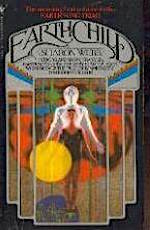 Author Sharon Webb was also a nurse, and often wrote medically-tinged sci-fi as well as medical thrillers, but this YA sequence is perhaps her best known work.
Author Sharon Webb was also a nurse, and often wrote medically-tinged sci-fi as well as medical thrillers, but this YA sequence is perhaps her best known work.
Humanity has perfected the Mouat-Gari process, which will grant immortality to anyone who hasn’t yet fully matured. But living forever comes with a catch—or, rather, a few catches. First, some of the adults are enraged that the gift of eternal life can only be given to children, which leads to years of societal upheaval. Far more important, however: it’s soon discovered that removing the specter of death has destroyed people’s will to create art. Either some people must choose mortality, or the artistic life of humanity will die just as biological immortality is gained. Should some people sacrifice eternity to provide art for the rest? And if so, how will the artists be chosen?
The Andromeda Strain—Michael Crichton
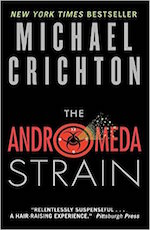 Microbes! From! SPAAAAACE! Michael Crichton’s The Andromeda Strain is a classic tale of space microbes that hitch a ride on a crashing satellite, and cause ‘disseminated intravascular coagulation’—lethal blood clotting. After the highly contagious illness wipes out the population of Piedmont, Arizona, the only two survivors are taken into a secret bunker. The microbe, codenamed Andromeda, begins mutating into new forms to try to escape containment, which in turn triggers the bunker’s failsafe, an atomic bomb set to destroy all life inside. The scientists are now locked in a very literal race against time: can they capture the microbe before it escapes? And can they stop the explosion before the bunker goes up in flames?
Microbes! From! SPAAAAACE! Michael Crichton’s The Andromeda Strain is a classic tale of space microbes that hitch a ride on a crashing satellite, and cause ‘disseminated intravascular coagulation’—lethal blood clotting. After the highly contagious illness wipes out the population of Piedmont, Arizona, the only two survivors are taken into a secret bunker. The microbe, codenamed Andromeda, begins mutating into new forms to try to escape containment, which in turn triggers the bunker’s failsafe, an atomic bomb set to destroy all life inside. The scientists are now locked in a very literal race against time: can they capture the microbe before it escapes? And can they stop the explosion before the bunker goes up in flames?
The Sector General series—James White
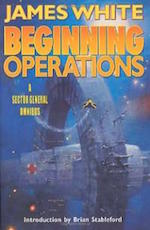 Doctors! In! SPAAAAACE! On its surface, the Sector General series is about doctors and nurses of all different alien races, working together to provide a hospital for any aliens that happen to come through. There are some really cool details—the doctors all have “educator tapes” downloaded into their minds, which, in addition to giving the doctor medical knowledge on whichever species they need, also contains the personality of the doctor who recorded the tape.
Doctors! In! SPAAAAACE! On its surface, the Sector General series is about doctors and nurses of all different alien races, working together to provide a hospital for any aliens that happen to come through. There are some really cool details—the doctors all have “educator tapes” downloaded into their minds, which, in addition to giving the doctor medical knowledge on whichever species they need, also contains the personality of the doctor who recorded the tape.
Author James White was so horrified by the sectarian violence he witnessed in Northern Ireland that he dedicated an entire science fiction series to celebrating pacifism, healing, and communication, and the result was a classic.
Dreamsnake—Vonda N. McIntyre
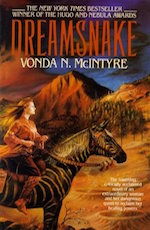 Vonda McIntyre’s Dreamsnake takes place on a post-apocalyptic Earth, where nuclear war has left much of the land irradiated and uninhabitable. A healer named Snake travels from town to town, using her snakes and the various venoms to help people. At the opening of the novel, she has three: Grass, a small dreamsnake whose venom acts as a painkiller, Sand, a rattlesnake whose venom can be used in potions, and Mist, whose venom is a stronger version of Grass’.
Vonda McIntyre’s Dreamsnake takes place on a post-apocalyptic Earth, where nuclear war has left much of the land irradiated and uninhabitable. A healer named Snake travels from town to town, using her snakes and the various venoms to help people. At the opening of the novel, she has three: Grass, a small dreamsnake whose venom acts as a painkiller, Sand, a rattlesnake whose venom can be used in potions, and Mist, whose venom is a stronger version of Grass’.
However, many of the villagers Snake visits fear her, and Grass is unfortunately killed when one group of patients panics. As dreamsnakes are extremely rare, this leaves Snake in a terrible position, and her wanderings soon turn into a quest for a new snake.
The M.D.: A Horror Story—Thomas Disch
 When Billy Michaels is 6 years old, the Roman god Mercury gives him a caduceus—a staff grants him the ability to heal people or harm them. As a child, healing people of chronic illnesses seems like the right thing to do… and so does punishing bullies and mean grandmas. But the magic and sly humor begin to curdle as he gets older, and the powers he wields become stronger. What does it mean for one person to have this kind of control over life and death? As William Michaels grows into adulthood, the power to heal interests him less—and the chance to wreak plagues upon the Earth seems far more tempting.
When Billy Michaels is 6 years old, the Roman god Mercury gives him a caduceus—a staff grants him the ability to heal people or harm them. As a child, healing people of chronic illnesses seems like the right thing to do… and so does punishing bullies and mean grandmas. But the magic and sly humor begin to curdle as he gets older, and the powers he wields become stronger. What does it mean for one person to have this kind of control over life and death? As William Michaels grows into adulthood, the power to heal interests him less—and the chance to wreak plagues upon the Earth seems far more tempting.
Children of the Night—Dan Simmons
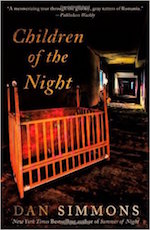 What if Romanian dictator Ceauescu was employed by strigoi—vampires—to keep a steady supply of infants for their bloodsucking needs? And what if, after Ceauescu’s fall, a vampiric baby ended up in an orphanage, and was revealed to have a nigh-miraculous type of blood that promised a cure for AIDs? This is the jumping-off point for Simmons’ thriller.
What if Romanian dictator Ceauescu was employed by strigoi—vampires—to keep a steady supply of infants for their bloodsucking needs? And what if, after Ceauescu’s fall, a vampiric baby ended up in an orphanage, and was revealed to have a nigh-miraculous type of blood that promised a cure for AIDs? This is the jumping-off point for Simmons’ thriller.
American research hematologist Kate Newman adopts the baby, bringing him back to the U.S. both to give him a home, and also to test the crap out of him and start figuring out what to do with his miracle blood. When the strigoi learn that baby Joshua has a link to their leader, Vlad Tsepes, they plot to kidnap him. But Kate and her ally Father Mike O’Rourke will stop at nothing to get him back—even if it means storming Castle Dracula itself.
The Changeling Plague—Syne Mitchell
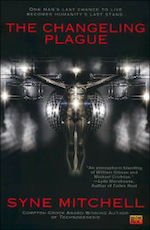 Geoffery Allan is dying of cystic fibrosis. In desperation, he spends his vast fortune searching for a cure, and finally finds a researcher willing to try an illegal treatment that will rewrite his DNA.
Geoffery Allan is dying of cystic fibrosis. In desperation, he spends his vast fortune searching for a cure, and finally finds a researcher willing to try an illegal treatment that will rewrite his DNA.
Obviously, this goes horribly wrong.
The DNA won’t stop rewriting, and then it begins spreading to everyone Allan comes in contact with. With the US government rounding up plague-stricken people, and with no hope of stopping the disease before it destroys humanity, Dr. Lillith Watkins has to team up with an unstable hacker called Idaho to try to find a way to recode human DNA.But will their attempted hack work in time?
The Time of the Fourth Horseman—Chelsea Quinn Yarbro
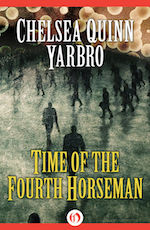 Chelsea Quinn Yarbro, best known for her Count Saint-Germain series, wrote an early novel about outbreaks and the race for a cure. The Time of the Fourth Horseman is a short novel that asks a terrifying question: how do you thin out a population swelled by lack of disease?
Chelsea Quinn Yarbro, best known for her Count Saint-Germain series, wrote an early novel about outbreaks and the race for a cure. The Time of the Fourth Horseman is a short novel that asks a terrifying question: how do you thin out a population swelled by lack of disease?
In the far-off wonderland of the 1990s, all disease has been eradicated, which has led to a population explosion. So naturally the U.S. government replaces a bunch of vaccines with placebos to thin the human race. The problem—or rather the second problem with this one, since the first is that whole “mass murder by disease” thing—is that the diseases naturally evolve into new forms, leaving doctors Dr. Natalie Lebbreau and Harry Smith to race for new cures before humanity is wiped from the face of the earth.
Tell us what we missed in the comments!
An earlier version of this list was published in July 2016.










